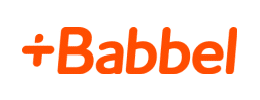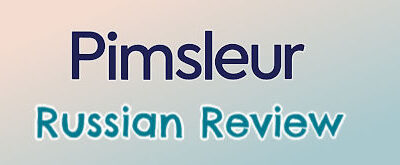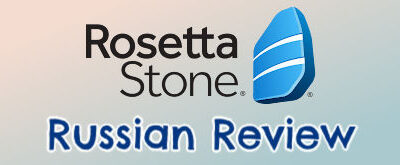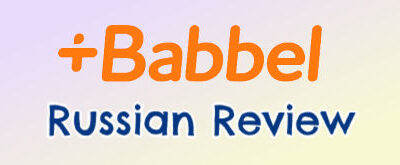I used the French language program from Babbel for six months alongside a number of other apps. In this review, I’ll discuss how the Babbel learning framework works, the cost of this app, the pros and cons of using Babbel to learn French, and of course, whether I think the Babbel French course is worth the money.
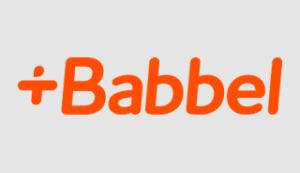
Babbel
- Multiple Subscription Options
- Free Sample Lesson
Pros
- Short, engaging lesson format (lessons take 10-15 mins)
- Accurate speech recognition software
- Affordable subscription plans (as low as $7 per month)
- Grammar instruction smartly layered into lessons
- Regular review sessions for vocab retention
- Modern and easy-to-use mobile app
Cons
- Verbal practice exercises are a little basic
- Not ideal for advanced learners
- Wish there were more Babbel French podcasts
Video Review: Thoughts On Babbel
In the above video, team member Bianca discusses her thoughts on Babbel French after using the app.
Learning French with Babbel (i.e. How It Works)
When it comes to language apps, a lot of other companies focus their programs on just one approach to teaching. Some either focus exclusively on audio lessons or on-demand videos. This approach is fine, and I think some of those apps are actually pretty good, but Babbel doesn’t do things that way.
Instead, Babbel takes a much more holistic approach to teaching French. Their lessons incorporate aspects of writing, speaking, reading and listening, as well as grammar, all through a variety of mediums and drills. It was clear to me that Babbel believes this more balanced approach is the more effective way of developing the language skills necessary to converse in French.
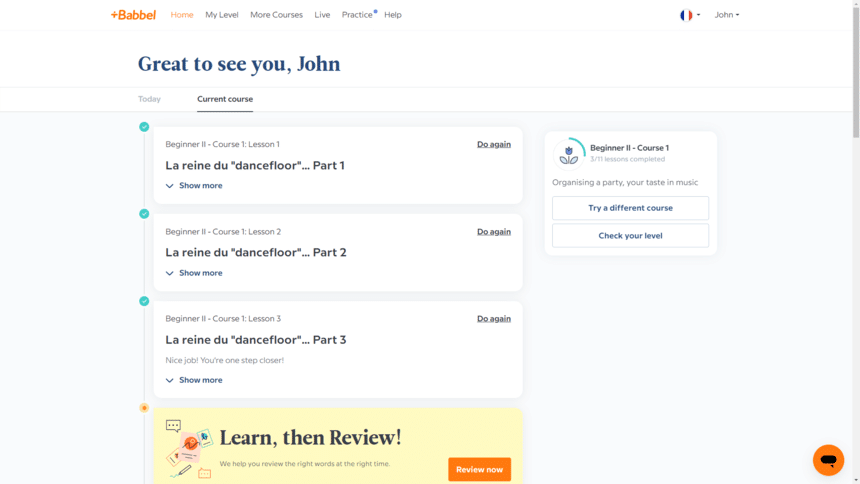
Plus, to reinforce what you learn in the standard Babbel lessons, they also regularly prompt you to complete review sessions to make sure that new vocabulary moves from your short term memory to your long term memory. Plus there are supplemental tools as well, like games, podcasts, and stories.
That’s essentially the Babbel method in a nutshell. The company packages their French lessons into a short, engaging lesson format, and then they reinforce what you’ve learned in those lessons with review sessions and other side tools. It’s pretty straightforward compared to other French language programs.
Babbel French Cost
Before I discuss what I like and don’t like about this framework, let’s talk about cost and how Babbel stacks up against competitors.
In the language learning world today, French app prices are kind of all over the place. You’ve got everything from Duolingo’s free plan to Pimsleur’s $475 lifetime packages. It really is pretty wide ranging.
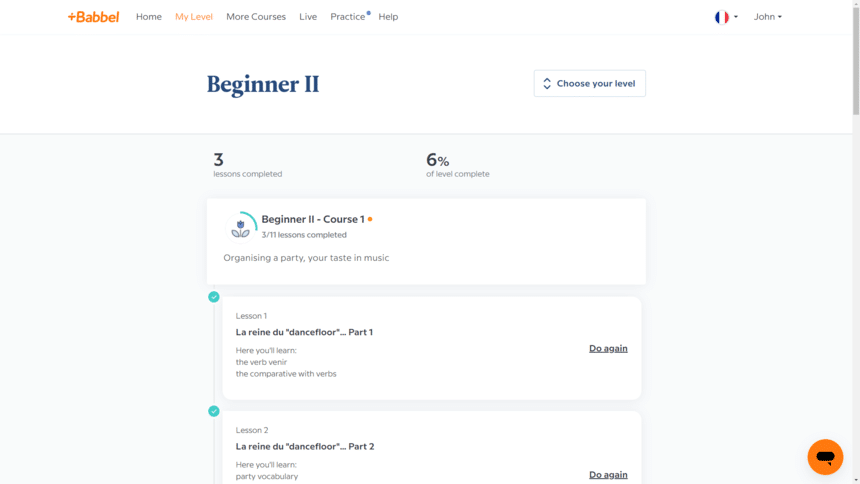
However, in terms of the cost of Babbel French, subscription options tend to land near the more affordable end of the spectrum. Packages range from around $7 to $15 per month, putting Babbel in line with apps like Rosetta Stone and Duolingo’s paid version.
I tend to think Babbel offers a lot of bang for your buck, and is a pretty serious value. Also, keep in mind that Babbel is almost always offering some sort of sale or special promotion, so make sure to check for discounts.
Strengths of The Babbel French Program
Having explained how the Babbel learning framework works, as well as how much it costs, let’s move into the pros and cons that I discovered as I tested this program.
Engaging Lesson Format
I really like the Babbel lesson format for two major reasons. The first is that each lesson is short.
The typical Babbel lesson only takes 10 to 15 minutes, which is super manageable. Not everyone has an hour or more to dedicate to language learning each day, so slow and steady progress in 15-minute chunks like this is a major advantage.
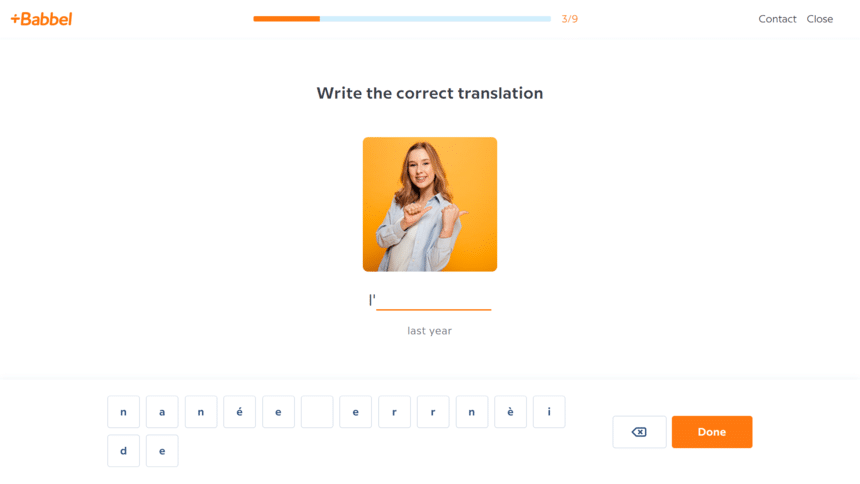
Secondly, the Babbel lessons are just plain fun. They move fast and mix in a bunch of different quick-hit drills and exercises, including fill-in-the-blanks, matching pairs, matching pictures to phrases, conjugating verbs, quick grammar tips, and a bunch more.
This diversity keeps the learning process fun and moving fast, so I have to give Babbel credit for that. The lessons just fly by.
Great Speech Software
The second highlight of this course is Babbel’s speech recognition software. I know every language company claims to have the best speech tool these days, but Babbel’s is actually good.
It’s easy-to-use, quick, and, in my experience, it’s one of the more accurate speech tools out there. I won’t lie—mastering the French accent is very hard, so having a tool that gives you direct feedback on your pronunciation is useful. I personally liked this feature a lot.
Integrated Grammar
I think Babbel does a really good job with grammar instruction. Rather than offering no grammar instruction at all, like some apps (see Rosetta Stone), or killing you with long, boring textbook style explanations, Babbel instead smartly layers grammar insights right into their lessons.
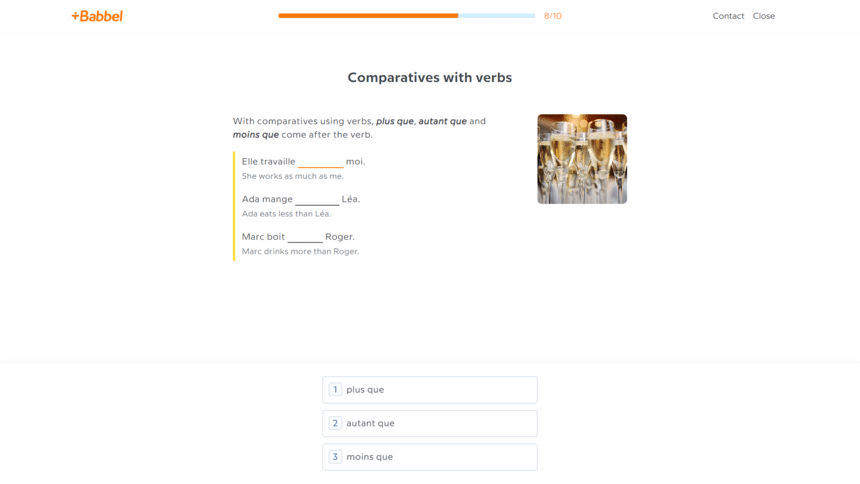
This usually entails short explanations followed by a couple quick examples. That way you have a basic understanding of the various rules behind French speech patterns, yet you don’t get bogged down in the minutiae.
The reality is that if there is too much focus on grammar, it can be information overload, and actually slow down your learning process; however, Babbel seems to strike a nice balance between too much and not enough grammar info.
Frequent Reviews of Vocab
I next want to highlight Babbel’s review sessions. Not only do I like that Babbel regularly prompts you to complete these review sessions so you can memorize vocab, but I also like that Babbel gives you the choice of how you want to review, which is pretty unique.
You have your choice between flashcards, listening, speaking, or writing. That way, if you feel like you are weak in a particular area (like listening for example, which is common), you can really fine tune your skills.
Sleek Mobile App & Interface
The last thing I want to mention is the Babbel digital platform and mobile app. The Babbel user experience is one of the best I’ve seen.
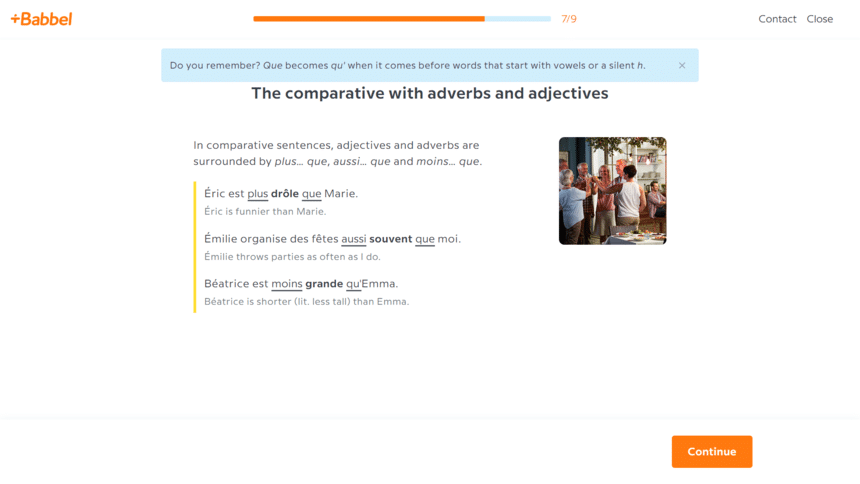
It’s clear the company has sunk significant resources into making their app and digital platform modern, intuitive and easy-to-use. In my opinion, it’s right up their with Duolingo for having the best tech in language learning.
Shortcomings of Babbel French
Now that we’ve covered the pros of the Babbel French program, let’s get to the negatives.
Lacking Verbal Practice Opportunities
My first big complaint with Babbel is that I wish they included more in-depth speaking exercises. The speaking drills included within lessons are fine, but they’re just a little more basic in nature.
You’re really just asked to listen to, and then repeat words and phrases in a vacuum. I would rather see exercises that were more robust and required more spontaneous language usage.
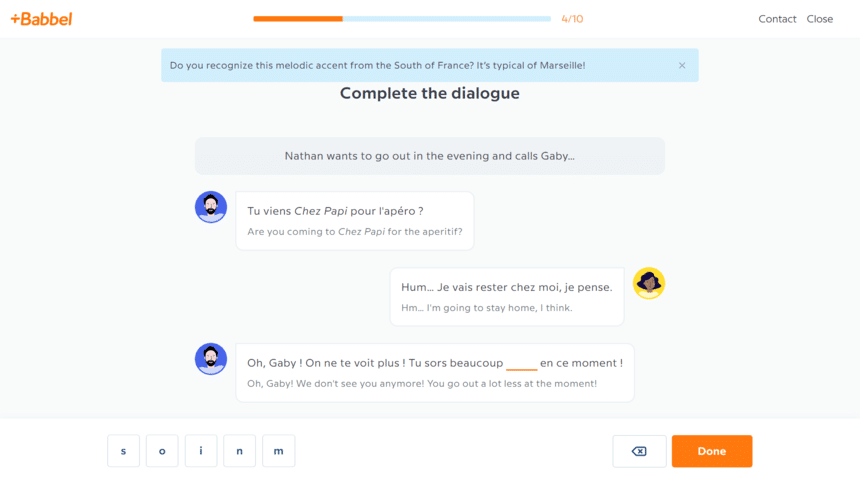
Some apps today are starting to incorporate AI into their programs so that you can have actual conversations, and I think an addition like that to the Babbel French program would be awesome.
Not Great For Advanced Learners
My second negative is that because those verbal practice exercises are somewhat elementary, I don’t think Babbel is the ideal choice for advanced French learners.
In my opinion, Babbel will work great for beginners and intermediate learners, but once you reach a certain level of fluency, you really need conversational practice to keep progressing.
Unfortunately though, you’ll just start to plateau with the standard Babbel lessons. Babbel does offer live classes once you get to this point, so that you can interact with French teachers and other learners at your level, but they do cost extra.
In short, I think the Babbel lessons are great to get you to an intermediate level of fluency, but from there, you might need to upgrade to a more robust program (like Rocket French).
Thin Podcast Library
Lastly, my final negative with Babbel is that their French podcast library is a little thin. I’m big on French audio lessons and podcasts once you hit a certain level, as you really need this element to boost your listening comprehension skills.
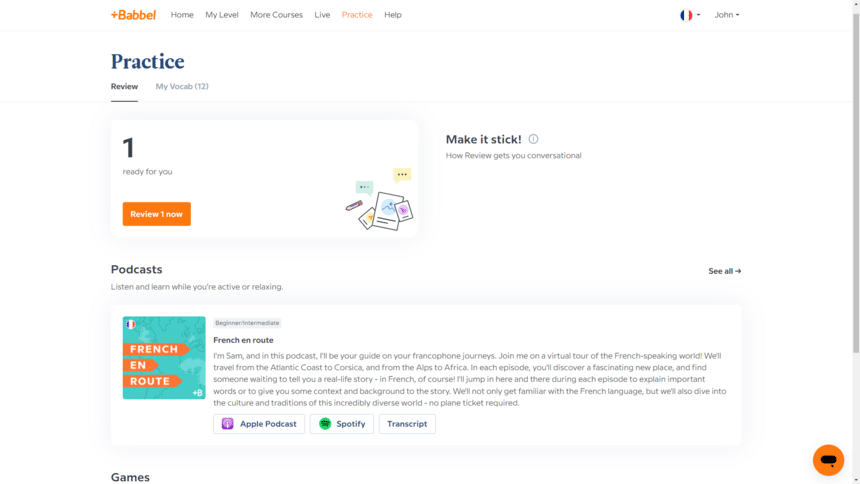
To this end, Babbel has some great podcasts, but there just aren’t many episodes. I was loving these Babbel podcasts, but there are only a handful of them. If Babbel would roll out a French podcast series for all levels, with dozens of episodes, that could be a game changer.
Final Thoughts: Is Babbel Good For Learning French?
I’ve used and reviewed around a dozen French language apps at this point, and I definitely think Babbel is one of the best, especially for beginners. The lessons are short, fun, and engaging. You get exposure to the French language from all angles with some really diverse drill types, including coverage of listening, reading, speaking, and writing. Their speech recognition software is top-notch, and the user experience across desktop and mobile is awesome.
Plus, it doesn’t hurt that the standard Babbel subscriptions are very affordable. Honestly, the only issue is that once you reach an intermediate level of fluency you will start topping out, so you’ll likely want to sign up for Babbel Live or another app, which might get expensive. Other than that though, Babbel is a great choice for learning French.
In my experience, Babbel is a great tool for learning French, especially for beginners. The program uses short and engaging lessons that only take 10 or 15 minutes to complete. I had a great experience with the Babbel French app.
Babbel French costs somewhere between $7 and $15 per month depending on which plan you select, as well as current discounts. Compared to other French apps, this is relatively inexpensive.
The short answer is no, Babbel French is not free. They do offer a free sample lesson for you to try out the program, but you must pay for the full Babbel French app (between $7 and $15 per month).
I had a relatively good experience with Babbel French and thought learning was fairly easy, especially with respect to the basics. As you get further into the Babbel French program, it does become more challenging, but that is to be expected.
There are more than 150 Babbel French lessons within the program. They seem to update and tweak their curriculum quite a bit, so it’s always a moving target, but there are a lot of lessons across the various units.

